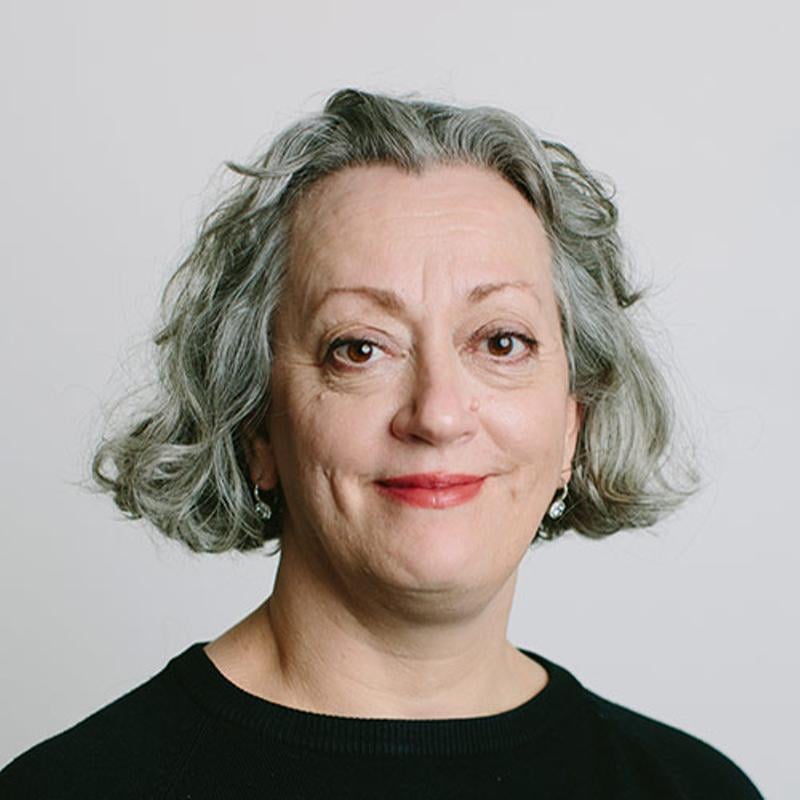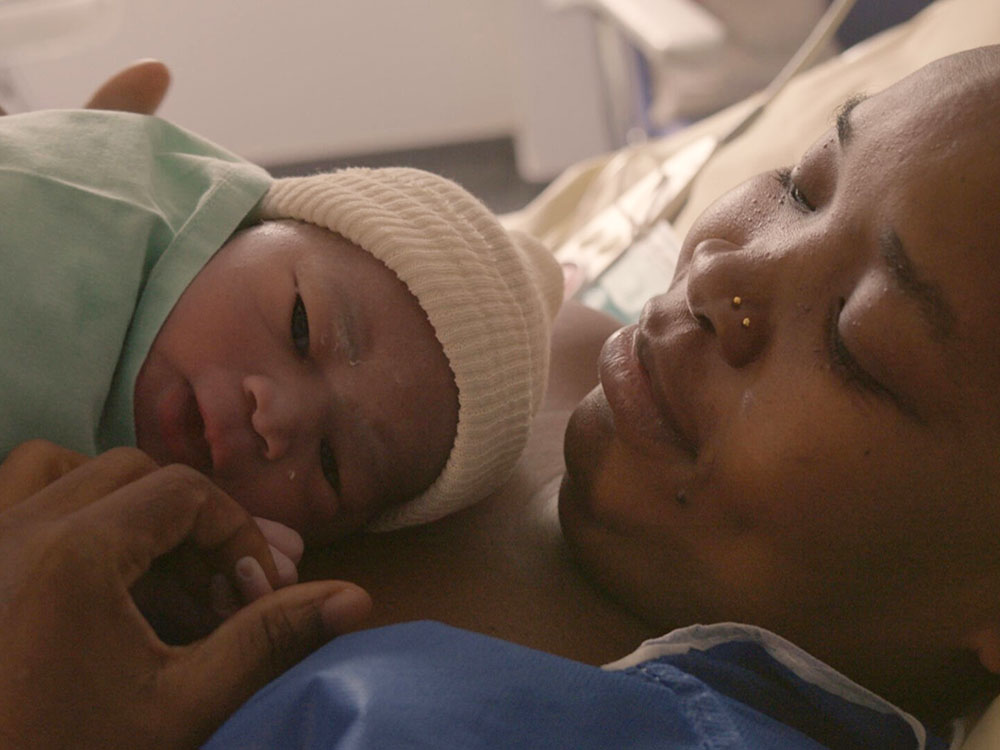Claire Simon’s new film Our Body is aptly titled. There are bodies everywhere: old, young, middle-aged, even those who aren’t yet born.
I first met Claire Simon in 2015 in DOXA’s inaugural French French program. Curated by the inimitable Thierry Garrel, that first year contained a total of 14 films. Claire’s documentary Géographie humaine (Human Geography) was one of them.
I didn’t know Claire’s work, and in the leadup to the festival that year, she’d driven me slightly mad by asking a million questions, changing her flight at the last moment, and being a bit elusive via email — but when she arrived in Vancouver, it was friendship at first sight. No nonsense, a straight shooter in every sense of the word, unsentimental, direct, she was as insightful and humane as her films suggested. I loved everything about her, but most especially I loved her films.
As part of DOXA that year, Claire offered a masterclass that featured a variety of clips from her body of work. I remember sitting in the audience, listening to her talk, my fingernails digging into my palms from anxiety and excitement.
I wanted to see all of these films, and know about the different people that they contained, whether it was an elderly French doctor, nearing retirement, but still committed to making his round of house calls or swarms of wilding preschoolers enacting the mysterious and deeply hilarious rites of recess playtime in Récréations. Or the titular figure of Mimi Chenola in the film Mimi, a film so simple on the surface — just the filmmaker and her friend walking and talking on a warm sunny day — yet containing an entire universe of experience.
After Claire’s masterclass was over, I found her in the hallway of SFU’s Centre for the Arts and began to babble hysterically. What finally came out was one word: “retrospective!” And that’s what we did. In the following year, 2016, DOXA offered a selection of her work, from her earliest work documentaries to her most recent. After DOXA, a number of other film festivals also presented retrospectives of her work. I’m still proud that we in Vancouver were one of the first.
There is a curious form of alchemy at work in Claire’s work that came into focus for me after seeing her films collected in one place. It isn’t magical or mysterious. In fact, it’s quite simple. It’s the act of paying attention, what philosopher Simone Weil called “the rarest and purest form of generosity.”
It isn’t just about the people onscreen, but also the places they inhabit, as much characters as any human being. Again, the different locations varied widely — a busy car repair shop, Paris’s epic Gare du Nord train station, La Fémis film school, a preschool playground. And on it goes.
The mixture of the mundane and the deeply strange that infuses these different places is especially the case of Le Bois dont les rêves sont faits (The Woods Dreams Are Made Of). Set in Le Bois de Vincennes, an enormous public park on the outskirts of Paris, it’s an ambling perambulation of a film, a journey into how a place can accommodate any number of different humans needs and yet still keep its own secrets.
Peopled by a wide variety of different folk — families picnicking, biologists researching salamanders, gay men trolling for sex in the bushes — the narrative wanders through open fields, dotted with people on blankets into more secluded locations, like a hermit’s secret dwelling deep in the forest. Off camera, Claire asks questions, laughs, makes plans. On camera, the people being filmed open up and tell the truth about their lives.
Everyone gets a chance to tell their story or speak their piece. You can almost see folks visibly relaxing as they come to understand that they’re free to simply be exactly who they are. They blossom like flowers under Simon’s gentle inquisition, offering up the essence of what it means to be alive and messing about in a park on a warm afternoon.
Life and death and everything in between
The events of people’s lives also form the meat of Our Body. Set in the gynecological section of a large Parisian hospital, as the film captures doctors and patients talking about their different experiences, courses of treatment, how to face death, how to give birth, how to transition from one gender to another, everyone is treated with respect and an innate civility.
At close to three hours in length (168 minutes to be exact), every moment feels absolutely crucial and critical, whether it’s a doctor gently stroking the bird-like hand of a dying patient or a new mother being handed her new baby girl.
Despite the emotional volatility of what is being captured onscreen — nothing less than the biggest moments that life has to offer — the tone is open, frank, even ordinary as the doctors, nurses and technicians go about their work, explaining treatment protocols, offering information and counselling patients, who are alternately sad, terrified, hopeful and uncertain about what is about to happen to them. There is simply no way to remain unaffected by the scenes of life and death and everything in between.
Unlike De Humani Corporis Fabrica, another documentary that also took a deep dive into the French medical system, there is never a disconnect between the people and the system in which they find themselves in Our Body. The title says it all. We are all uniquely and commonly cojoined by physical, corporeal reality.
As the patients and physicians interact, something of the sacred is taking place. It isn’t just procedures and medication, but the act of telling another person about your pain, fear and needs. Whether it’s a teenage girl talking about an unplanned pregnancy or an older trans woman seeking advice about hormonal treatment. This same kindness and fairness are also offered to the filmmaker herself when she becomes a patient. When she is diagnosed with breast cancer during the production of the film, Claire, too, becomes another body in need of care. It’s an act of both solidarity and deep humanity.
Watching Our Body, shades from Claire’s earlier films, like so many fascinating spirits, hover about, whether it’s the women from God’s Offices talking to doctors about the decision to have a child or not or the figure of Dr. Jean-Marie Bouvier, an effortlessly charming and exquisitely civilized human being, alternating between chiding his patients for their vices and gently flirting with elderly ladies in genteel apartments.
In Thierry Garrel’s essay entitled Woman with a Movie Camera, featured in DOXA’s 2016 program guide, he wrote: “Whether it is teenagers, little children, old folks or sex workers, Simon is able to establish her documentary pact with people of a different age, sexual orientation, religion and race. In so doing, she dives deep into the human soul to reveal the universality of experience — be it shame, pride, desire, sorrow or joy. What ultimately emerges is the thrilling experience of being human. Or as the French documentarist Dominique Dubosc so perfectly stated: ‘Of rediscovering that there is but one human species and I belong to it.’”
Looking back at old program notes from DOXA’s festivals past, I am struck by how much of life is captured in Claire’s films — children, parenthood, friendships, work and now mortality, but thankfully, not yet, not quite yet, please. There are more films to be made.
The Tyee’s Culture Editor Dorothy Woodend will be introducing the screening of ‘Our Body’ at the Cinematheque in Vancouver on Aug. 31. ![]()

















Tyee Commenting Guidelines
Comments that violate guidelines risk being deleted, and violations may result in a temporary or permanent user ban. Maintain the spirit of good conversation to stay in the discussion and be patient with moderators. Comments are reviewed regularly but not in real time.
Do:
Do not: